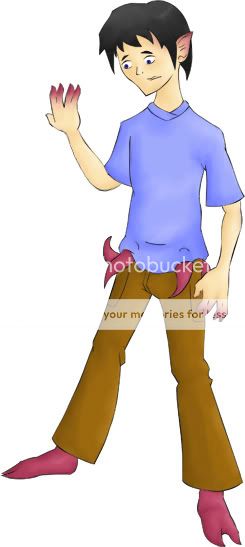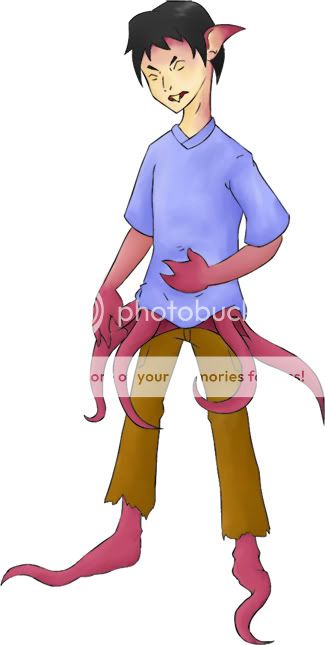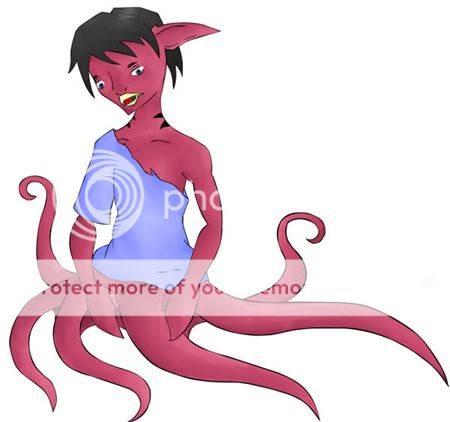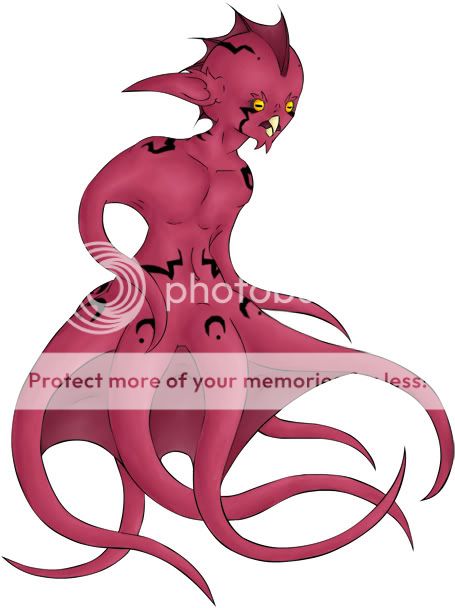The octopus (Greek Ὀκτάπους, 'eight-legs') is a cephalopod of the order Octopoda that inhabits many diverse regions of the ocean, especially coral reefs. The term may also refer to only those creatures in the genus Octopus. In the larger sense, there are 289 different octopus species, which is over one-third of the total number of known cephalopod species.
Contents
PhysiologyOctopuses are characterized by their eight arms (not tentacles), usually bearing suction cups. These arms are a type of muscular hydrostat. Unlike most other cephalopods, the majority of octopuses — those in the suborder most commonly known, Incirrina — have almost entirely soft bodies with no internal skeleton. They have neither a protective outer shell like the nautilus, nor any vestige of an internal shell or bones, like cuttlefish or squids. A beak, similar in shape to a parrot's beak, is the only hard part of their body. This enables them to squeeze through very narrow slits between underwater rocks, which is very helpful when they are fleeing from morays or other predatory fish. The octopuses in the less familiar Cirrina suborder have two fins and an internal shell, generally lessening their ability to squeeze into small spaces.
Octopuses have a relatively short life span, and some species live for as little as six months. Larger species, such as the North Pacific Giant Octopus, may live for up to five years under suitable circumstances. However, reproduction is a cause of death: males can only live for a few months after mating, and females die shortly after their eggs hatch, for they neglect to eat during the (roughly) one month period spent taking care of their unhatched eggs.
Octopuses have three hearts. Two pump blood through each of the two gills, while the third pumps blood through the body. Octopus blood contains the copper-rich protein hemocyanin for transporting oxygen. Less efficient than the iron-rich hemoglobin of vertebrates, the hemocyanin is dissolved in the plasma instead of being bound in red blood cells and gives the blood a blue color. Octopuses draw water into their mantle cavity where it passes through its gills. As mollusks, octopuses have gills that are finely divided and vascularized outgrowths of either the outer or the inner body surface.
IntelligenceOctopuses are highly intelligent, probably more intelligent than any other order of invertebrates. The exact extent of their intelligence and learning capability is much debated among biologists, but maze and problem-solving experiments have shown that they do have both short- and long-term memory. Their short lifespans limit the amount they can ultimately learn. There has been much speculation to the effect that almost all octopus behaviors are independently learned rather than instinct-based, although this remains largely unproven. They learn almost no behaviors from their parents, with whom young octopuses have very little contact.
An octopus has a highly complex nervous system, only part of which is localized in its brain. Two-thirds of an octopus's neurons are found in the nerve cords of its arms, which have a remarkable amount of autonomy. Octopus arms show a wide variety of complex reflex actions arising on at least three different levels of the nervous system. Some octopuses, such as the Mimic Octopus, will move their arms in ways that emulate the movements of other sea creatures.
In laboratory experiments, octopuses can be readily trained to distinguish between different shapes and patterns. They have been reported to practice observational learning, although the validity of these findings is widely contested on a number of grounds. Octopuses have also been observed in what some have described as play: repeatedly releasing bottles or toys into a circular current in their aquariums and then catching them. Octopuses often break out of their aquariums and sometimes into others in search of food. They have even boarded fishing boats and opened holds to eat crabs.
In some countries octopuses are on the list of experimental animals on which surgery may not be performed without anesthesia. In the UK, cephalopods such as octopuses are regarded as honorary vertebrates under the Animals (Scientific Procedures) Act 1986 and other cruelty to animals legislation, extending to them protections not normally afforded to invertebrates.
A common belief is that when stressed, an octopus may begin to eat its own arms. However, limited research conducted in this area has revealed that the cause of this abnormal behavior, called autophagy, may be a virus that attacks the octopus's nervous system. Thus this behavior may be more correctly labeled as a neurological disorder.
DefenseThree defensive mechanisms are typical of octopuses: ink sacs, camouflage, and autotomising limbs.
Most octopuses can eject a thick blackish ink in a large cloud to aid in escaping from predators. The main colouring agent of the ink is melanin, which is the same chemical that gives humans their hair and skin colour. This ink cloud dulls smell, which is particularly useful for evading predators that are dependent on smell for hunting, such as sharks.
An octopus's camouflage is aided by certain specialized skin cells which can change the apparent color, opacity, and reflectiveness of the epidermis. Chromatophores contain yellow, orange, red, brown, or black pigments; most species have three of these colors, while some have two or four. Other color-changing cells are reflective iridophores, and leucophores (white). This color-changing ability can also be used to communicate with or warn other octopuses. The very venomous blue-ringed octopus becomes bright yellow with blue rings when it is provoked.
When under attack, some octopuses can detach their own limbs, in a similar manner to the way skinks and other lizards detach their tails. The crawling arm serves as a distraction to would-be predators; this ability is also used in mating.
A few species, such as the Mimic Octopus, have a fourth defense mechanism. They can combine their highly flexible bodies with their color changing ability to accurately mimic other, more dangerous animals such as lionfish, sea snakes and eels. They have also been observed changing the texture of their mantle in order to achieve a greater camouflage. The mantle can take on the spiky appearance of seaweed, or the scraggly, bumpy texture of a rock, among other disguises.
ReproductionWhen octopuses reproduce, males use a specialized arm called a hectocotylus to insert spermatophores (packets of sperm) into the female's mantle cavity. The hectocotylus, usually the third right arm, detaches from the male during copulation. Males die within a few months after mating. In some species, the female octopus can keep the sperm alive inside her for weeks until her eggs are mature. After they have been fertilized, the female lays about 200,000 eggs (this figure dramatically varies between families, genera, species and also individuals). The female hangs these eggs in strings from the ceiling of her lair, or individually attaches them to the substratum depending on the species. The female cares for the eggs, guarding them against predators, and gently blowing currents of water over them so that they get enough oxygen. The female does not eat during the roughly one-month period spent taking care of the unhatched eggs. At around the time the eggs hatch, the mother dies and the young larval octopuses spend a period of time drifting in clouds of plankton, where they feed on copepods, larval crabs and larval starfish until they are ready to sink down to the bottom of the ocean, where the cycle repeats itself. In some deeper dwelling species, the young do not go through this period. This is a dangerous time for the larval octopuses; as they become part of the plankton cloud they are vulnerable to many plankton eaters.
SensationOctopuses have keen eyesight. Although their slit-shaped pupils might be expected to afflict them with astigmatism, it appears that this is not a problem in the light levels in which an octopus typically hunts. Surprisingly, they do not appear to have color vision, although they can distinguish the polarization of light. Attached to the brain are two special organs, called statocysts, that allow the octopus to sense the orientation of its body relative to horizontal. An autonomic response keeps the octopus's eyes oriented so that the pupil slit is always horizontal.
Octopuses also have an excellent sense of touch. An octopus's suction cups are equipped with chemoreceptors so that the octopus can taste what it is touching. The arms contain tension sensors so that the octopus knows whether its arms are stretched out. However, the octopus has a very poor proprioceptive sense. The tension receptors are not sufficient for the octopus brain to determine the position of the octopus's body or arms. (It is not clear that the octopus brain would be capable of processing the large amount of information that this would require; the flexibility of an octopus's arms is much greater than that of the limbs of vertebrates, which devote large areas of cerebral cortex to the processing of proprioceptive inputs.) As a result, the octopus does not possess stereognosis; that is, it does not form a mental image of the overall shape of the object it is handling. It can detect local texture variations, but cannot integrate the information into a larger picture.
The neurological autonomy of the arms means that the octopus has great difficulty learning about the detailed effects of its motions. The brain may issue a high-level command to the arms, but the nerve cords in the arms execute the details. There is no neurological path for the brain to receive feedback about just how its command was executed by the arms; the only way it knows just what motions were made is by observing the arms visually.
LocomotionOctopuses move about by crawling or swimming. Their main means of slow travel is crawling, with some swimming. Their only means of fast travel is called jet propulsion. Their fastest movements only occur when provoked by hunger or if in danger. Because the rate at which oxygen is transported to the blood is an estimated 4% in octopuses, it gives them a high disadvantage in the wild for having poor stamina.
They crawl by walking on their arms, usually on many at once, on solid surfaces, while supported in water. In 2005 it was reported that some octopuses can walk on two arms on a solid surface, while at the same time imitating a coconut or a clump of seaweed.
They swim by expelling a jet of water from a contractile mantle, and aiming it via a muscular siphon.
Though octopuses can be difficult to keep in captivity, some people keep them as pets. Octopuses often escape even from supposedly secure tanks, due to their intelligence, problem solving skills, mobility and lack of rigid structure. The variation in size and life span among octopus species makes it difficult to know how long a new specimen can naturally be expected to live. That is, a small octopus may be just born or may be an adult, depending on the species. By selecting a well-known species, such as the California Two-spot Octopus, one can choose a small octopus (around the size of a tennis ball) and be confident that it is young with a full life ahead of it.
Octopuses are also quite strong for their size. Octopuses kept as pets have been known to open the covers of their aquariums and survive for a time in the air in order to get to a nearby feeder tank and gorge themselves on the fish there. They have also been known to catch and kill some species of sharks.
Source:
Wikipedia


















